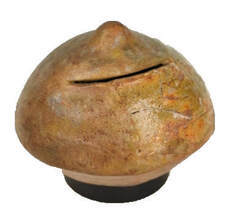Piggy Bank
 Scottish pirlie pig / Historic Environment Scotland
Scottish pirlie pig / Historic Environment Scotlandhttps://www.historicenvironment.scot
What do piggy banks have to do with pigs?
To make a long story short, not much is known for certain about the origin of the term piggy bank. However, to make a short story long, there are a number of different theories or ‘folk etymologies’.
The earliest known pig-shaped money containers are from 12th century Java. The Javanese term celengan (likeness of a wild boar) is still used today to mean a savings or ‘piggy bank’.
The earliest pig-shaped money containers in Europe were from 13th century Germany where pigs were considered symbols of good fortune.
In the European Middle Ages, an orange-colored clay called pygg was used to make various household pots and containers, including bed warmers (check out the Eric Bogle song). 1 People kept their money (i.e., their coins) in such a pygg pot.
In mid-15th century Scottish and Northern English, the word pig meant an earthenware pot, pitcher, or jar. The 18th century Scottish term ‘pirlie pig’ was a small money box, usually circular and made of earthenware.
At some point, the pygg money pot began to be shaped as a pig; perhaps, simply because the word pygg rhymed with the word pig (a word from the early 14th century meaning a swine or hog regardless of age or sex). Or, because of traditional associations of pigs with good fortune.
The term ‘piggy bank’ (an item usually given to a child) is from the 1940s and is likely from the term ‘pig bank’ (a ceramic or tin souvenir from Mexico) first seen in 1903.
1 Clay bottles, made from pygg, were filled with hot water were used and are still used as bed-warmers in some parts of Britain. They are known as ‘pigs’ or ‘china pigs’. Eric Bogle has a great song called “Wee China Pig” about a bed-warmer.
https://www.youtube.com/watch?v=smjv468ZnfY&ab_channel=EricBogle-Topic
Pirlie pig Image: https://www.historicenvironment.scot/archives-and-research/archives-and-collections/properties-in-care-collections/object/pirlie-pig-15th-century-16th-century-late-medieval-melrose-abbey-749
Reference: Online Etymological Dictionary, https://www.etymonline.com/
https://en.wikipedia.org/wiki/Piggy_bank
Published on February 05, 2022 09:41
No comments have been added yet.



